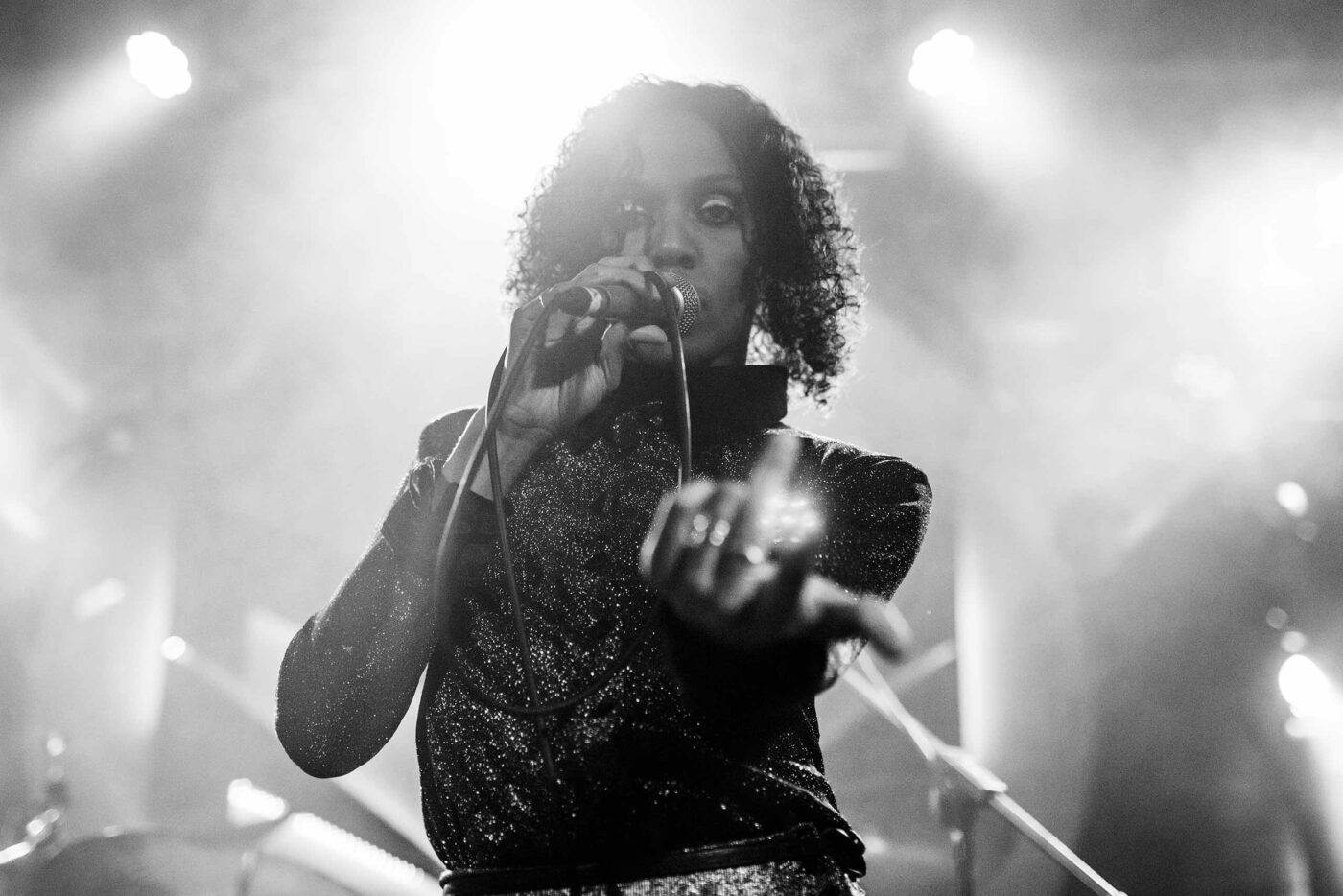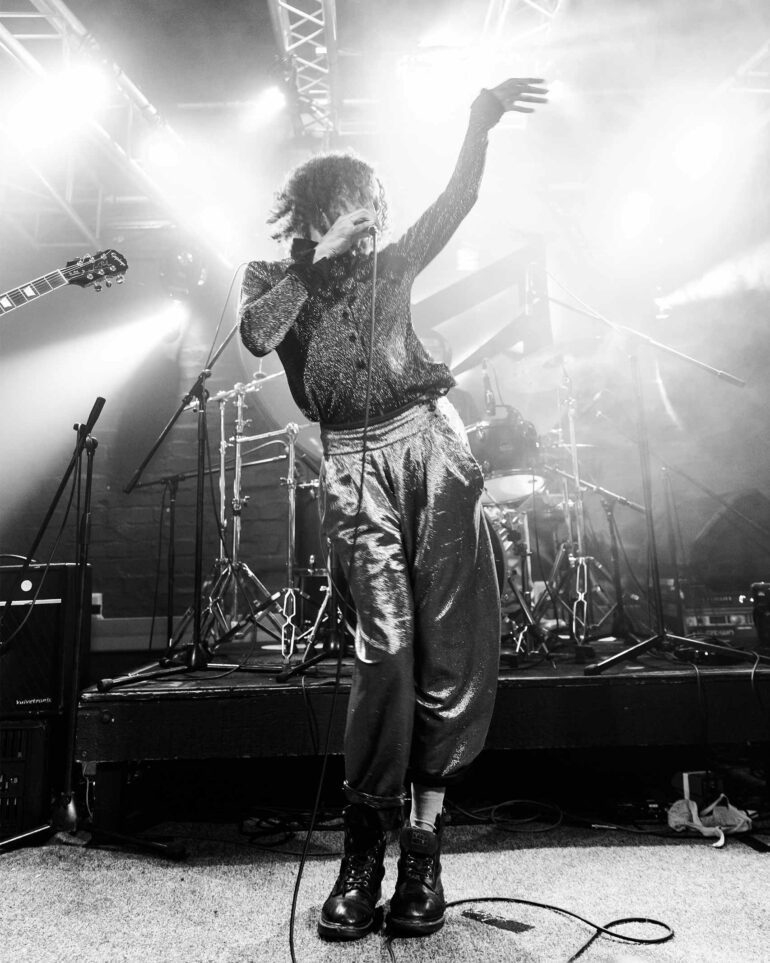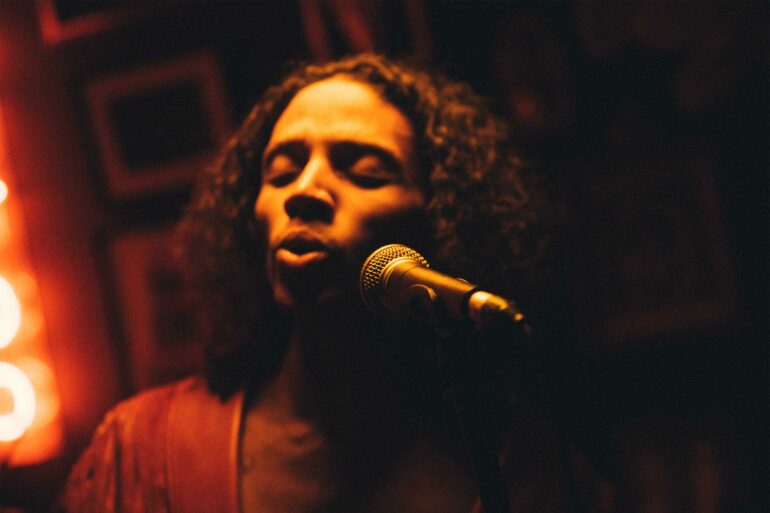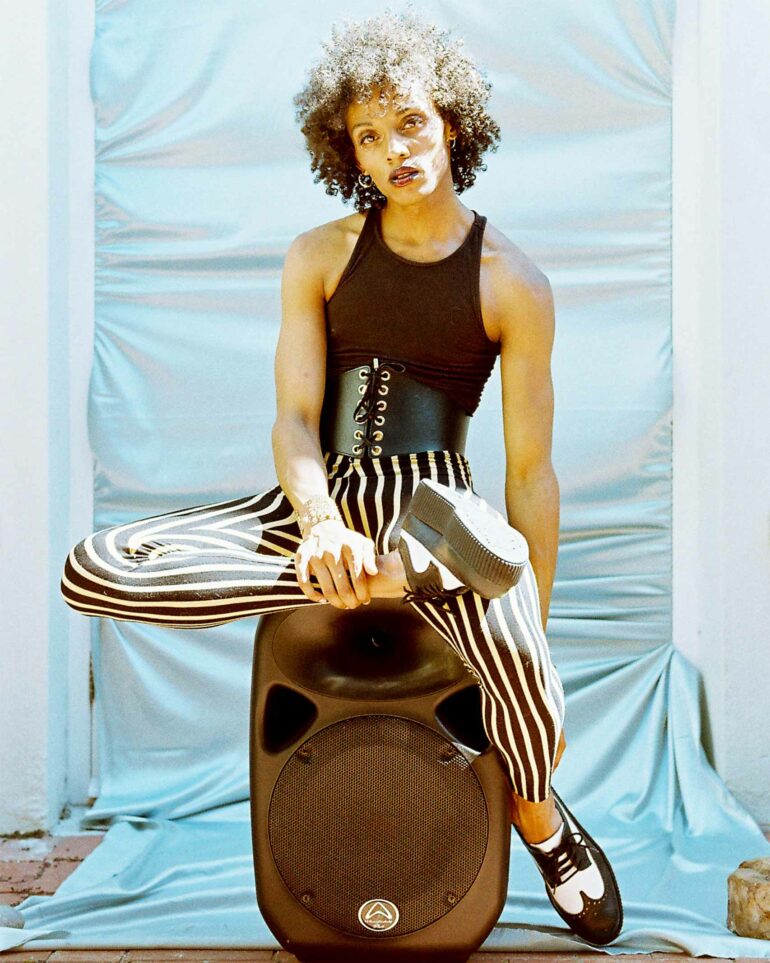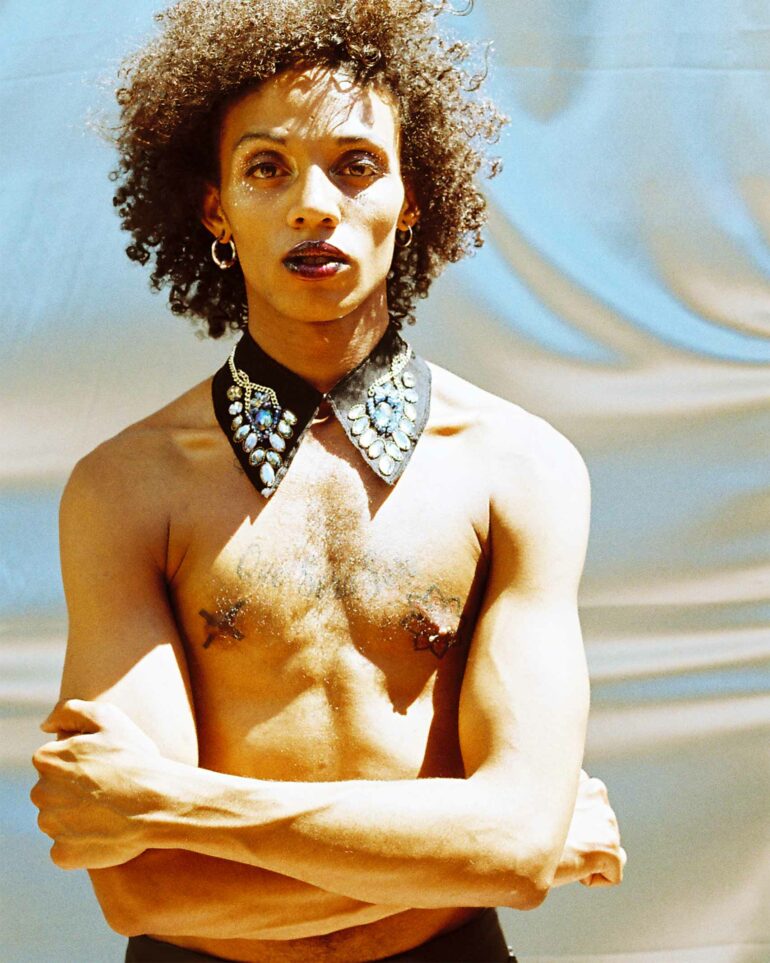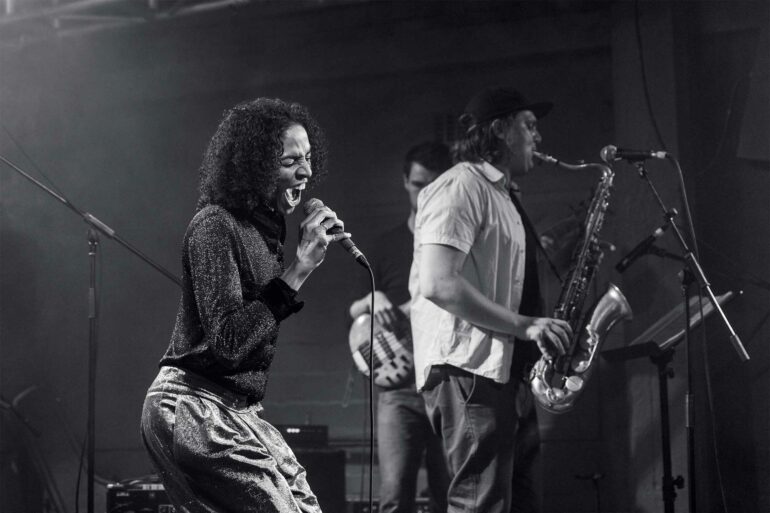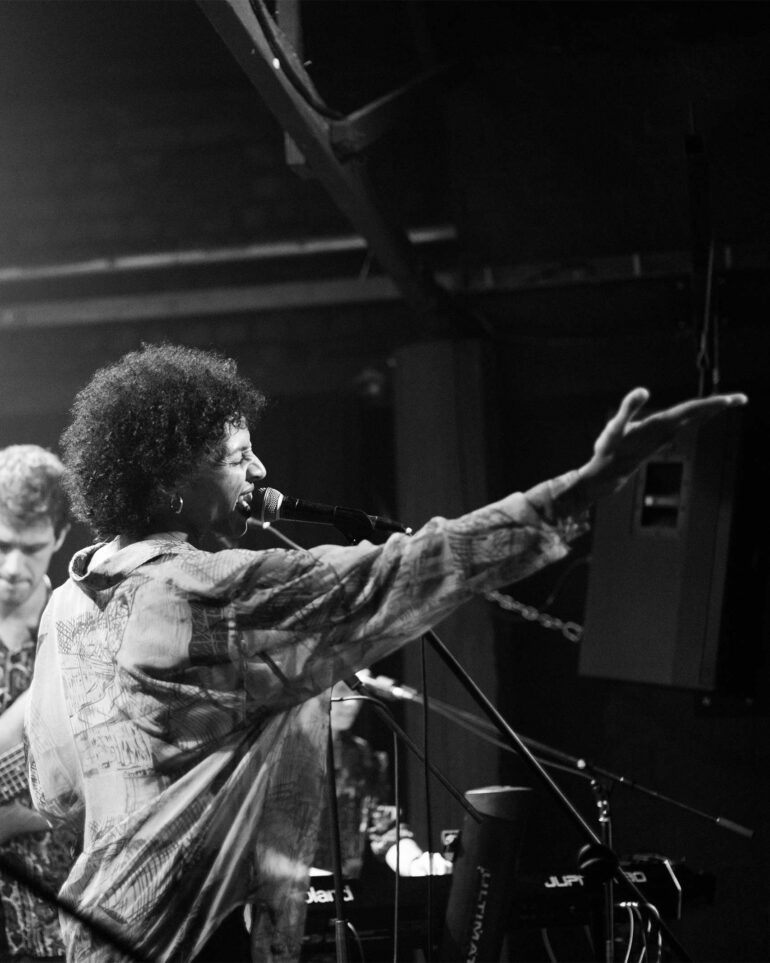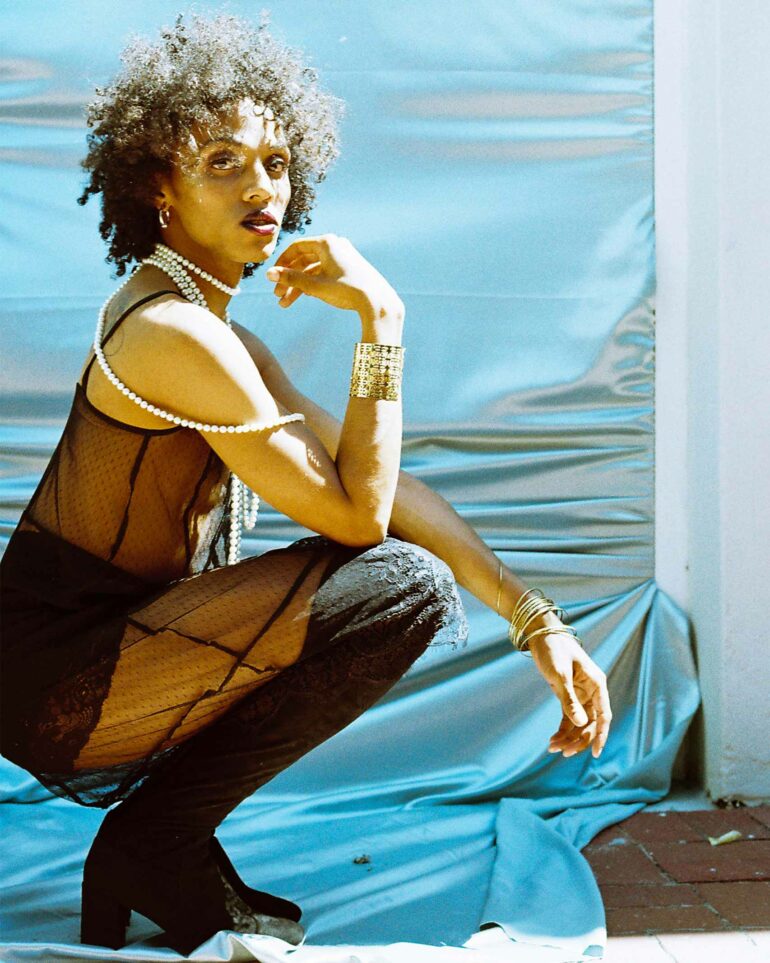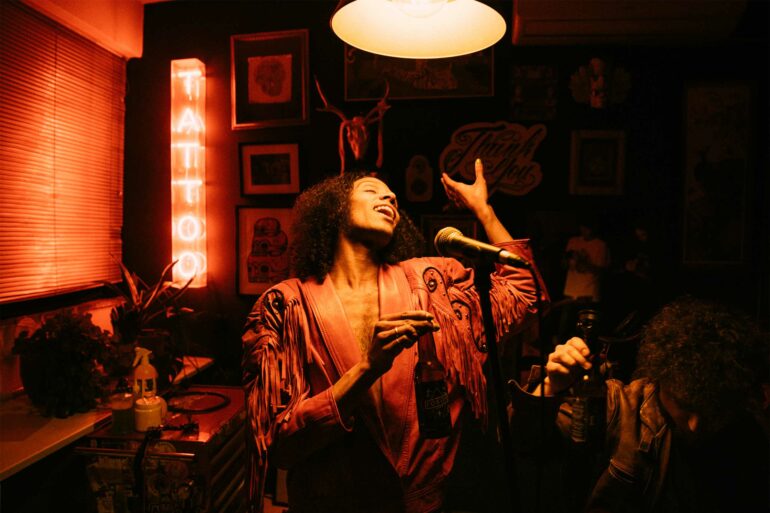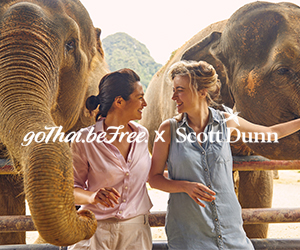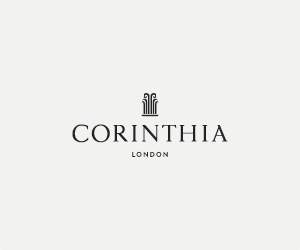Part of the DIY generation of Capetonian musicians, the ethos of marching to the beat of one’s own drum has always been music to the ears of artist Al Clapper. Proudly queer and hell-bent on redefining the Cape Town sound, his pole star is on the rise.
‘Deviant Days’, the up-tempo and coquettish, funky, alt-jazz meets doo-wop-homage by Capetonian band androgenius – with its seductive melody and sultry vocal harmony – is befittingly the earworm of my trip to the Mother City. I’m thrilled, as the last time that I was here, it was the inescapable warble of ‘Waka Waka’. Cape Town has come far in over a decade, and thankfully so has the music. The song is an apt soundtrack to my journey here, amalgamating the emotions of what it means to be living in the moment once again and to be back discovering this beautiful part of South Africa after all this time.
androgenius’s singer, Al Clapper, is a gay and gifted musician with a velvety voice and bubbly persona. His opening words when we meet are, “you can call me Al.” But not even the mention of the synapse-triggering, South African-inspired anthem by Paul Simon can knock ‘Deviant Days’ out of my head.
Alden Clapper, formerly of Pretoria, dropped the ‘den’ from his name on his escape from the executive capital of South Africa to Cape Town, to start afresh over a decade ago. He doesn’t mince his words, calling Pretoria a “big town with a small-town mentality, one filled with conservative Afrikaans who are intolerant of progressiveness.”
Having dropped out of his journalism degree (and compounding his parents’ devoutly Christian disappointment), he came to Cape Town to study music.
Al’s earliest memory of performing goes back to 6-year-old Alden. He was a classical pianist, but his brother – just a couple of years younger than him – followed suit and quickly proved to be the better player. So Al made a transition to singing, with his sibling playing along on the piano or guitar.
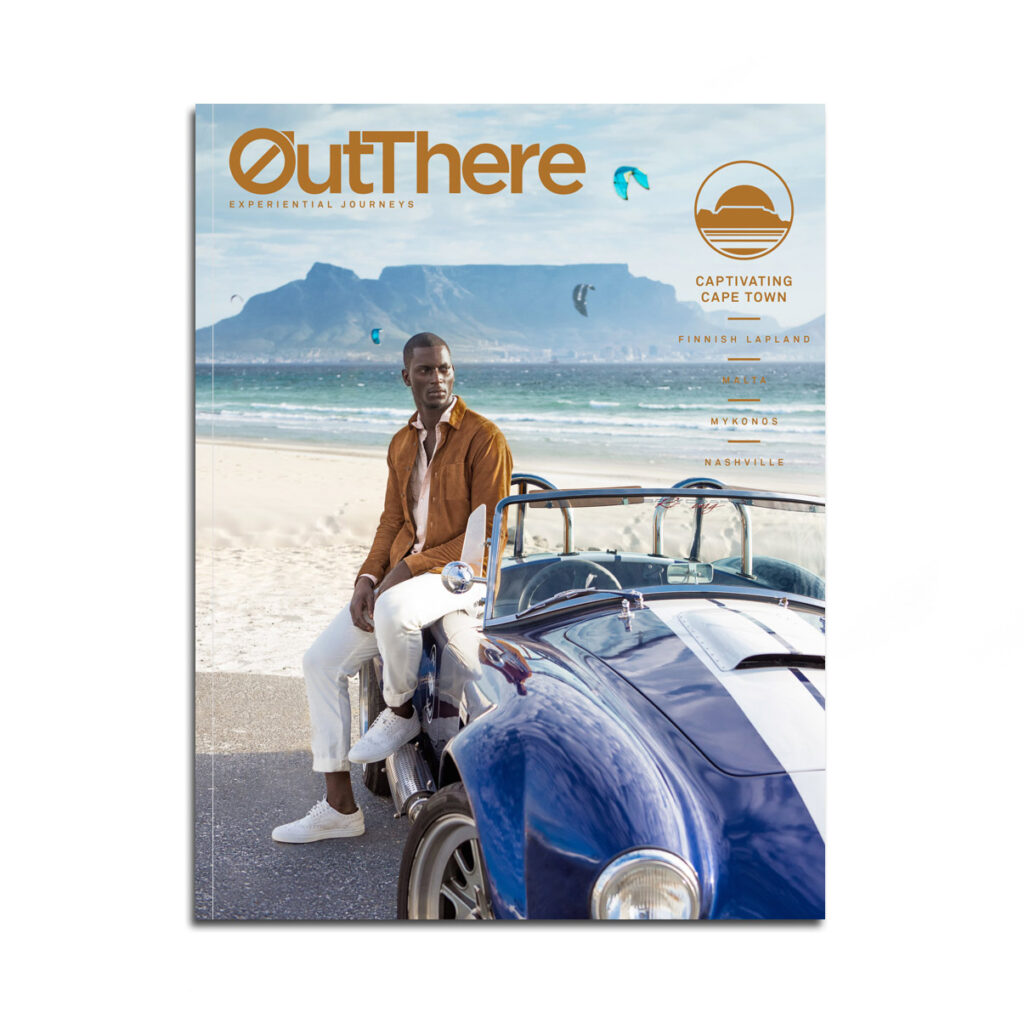
This story first appeared in The Captivating Cape Town Issue, available in print and digital.
Subscribe today or purchase a back copy via our online shop.
“I cut my teeth performing in church. Now, don’t picture a black American church with a soulful, raise-the-roof, church choir. I went to the oldest, whitest church there was in Pretoria. You just have to imagine their faces, when I played my version of Christian-friendly rap lyrics to Eminem backtracks, or my rendition of Alicia Keys’s ‘If I ain’t got You’, dedicated to the Lord and Saviour. But once I got a taste for performing, I was hooked,” Al tells me.
He describes the music he creates as ‘Soul-Hop’. I wonder what inspires the unique fusion of sounds from his latest album. Perhaps the short stint of living in Louisiana with his family during his formative years had a profound impact, the same influence it has had on what locals call Cape Jazz.
“While I wished I had beat Snarky Puppy to coining it, it’s ‘music for the brain and the booty’. My father, who is the greatest consumer of music I know, got me into old-school R&B, soul and jazz. He is definitely a big influence. As it currently stands, I’m actually studying as a ‘mature student’ towards a jazz degree, something that I was always supposed to get to and has finally come to fruition,” says Al.
Starting his first band, Indigo Child, was a defining moment. After just a few years of playing, the collective won a battle-of-the-bands type competition that led them to open one year for the V&A Waterfront’s New Year’s Eve party. But despite their success, they disbanded, a crisis which saw Al stop performing for over a year.
Then on a pilgrimage with his father and brother to “musical fucking mecca,” the Jazz in Marciac festival in Southern France, he was inspired to play and make music once again. On his return to South Africa, he immediately joined two bands and started androgenius, leading to what he terms his biggest musical achievement, releasing his second six-track EP that includes ‘Deviant Days’.
“It’s the most accomplished that I’ve ever felt as a songwriter and as a vocalist,” Al confesses. “My goal is to record a full-length album, since for the last couple of years, all my tour aspirations have involuntarily been put on hold because of the pandemic. When things go back to normal, I’d love to tour this album across the country, and then hit Europe for at least one summer season. Success for me is eventually getting to a point where I’m making a comfortable living as a performer, so I can get rid of my side hustles,” he declares.
I ask if Capetonians of colour still struggle to be heard in art and culture. Even having noted that there has been a slight paradigm shift on race, it seems to me that the city’s social scene still predominantly leans toward white lifestyles, and culture in the city is built around white social preferences.
“There’s a huge gap. Cape Town is incredibly segregated. Coloured and black people live far out of town. Millions of black people live in complete squalor in the townships, some of which border the most affluent neighbourhoods in the city. The white enclaves of Constantia, Bishops Court and Camps Bay are home to the most expensive properties in the world. The financial disparity caused by Apartheid is still very real, and with that comes the imbalanced appreciation of any kind of art. One calendar event – AfrikaBurn – sums it up very well. A whole bunch of privileged white people spend months of planning, raising funds and hosting parties in the name of pure hedonism, to gather in the desert, and spend millions on creating incredible structures that they burn to the ground when the festival is over, while the black and coloured people they live alongside don’t even have desks in their classrooms … desks that could very easily have been built using all the stuff they burn,” explains Al. “I will add though, that the crazy thing is… here we are, enjoying the comfort and security of my three-bedroom Victorian home in Vredehoek, an easy walk from the CBD. I own that I’m a privileged coloured boy who until last year, hadn’t stepped foot in a township and is currently not doing anything to change anything. Right now, I’m just trying to hustle hard enough so that I can live as lavish a life as the white people I have found myself in the company of.”
“Al tells me that there is good queer representation by people of colour in the theatre, dance and art scenes. Performers gravitate towards these as such jobs are better paid than being a musician”
I understand the paradox. Cape Town is a city where there is a great privilege divide. Everyone aspires to do better here – to be richer; and more established – congruent with the idealised white Capetonian lifestyle that has been set as the standard because of Apartheid and its pervasive hangover. And while there is now greater equality here, it is still very hard for those on the uphill climb to bring the village with them. Despite this, I feel that the emergence of role models – particularly non-white, queer, creative folk like Al – is critical. It is clear that South Africa has a long way to go to challenge its deeply ingrained notions of race. But in 1996, the country became the first nation in the world to explicitly prohibit discrimination based on sexual orientation in its constitution.
“The gay scene here is also quite racially divided. Black and coloured gay guys have their venues like Zer021 and Stargayzers. White gays have what is basically the whole De Waterkant gaybourhood. Then there are the alt-gays, who are definitely the most racially integrated and gender-diverse group. They’re the fashionistas, theatre queens and artsy queers, who have their own venues like EVOL. I define queer tribes by their venues because clubbing and socialising is how the LGBTQ+ community here in Cape Town spend their time out,” explains Al.
Al tells me that there is good queer representation by people of colour in the theatre, dance and art scenes. Performers gravitate towards these as such jobs are better paid than being a musician.
“There are fewer queer people of colour in music, but I feel that the live music scene doesn’t really have the time for such segregation, thankfully. Our popularity and success really depend on the music we create. Take K-Dollahz, an incredible trans, coloured, hip-hop DJ, for instance. They played big events like Rocking the Daisies and the Cape Town Electronic Music Festival. Parabyl, a coloured queer muso, has also featured on some burning lineups because of the music he makes. Mx Blouse, a queer, black performer who raps over house and kwaito beats recently played at Nightscape. I haven’t yet breached any of those line-ups because I’m not a DJ, nor do I make house music or EDM. I’m a live musician who has played some of the best live stages in the country and my band is a diverse mix of black, white, queer and hetero. I don’t feel that we’ve been excluded from any lineups because of who I am, other than my superior musical taste,” he laughs.
Al also thinks that being a queer person in South Africa can actually propel your career.
“In my opinion, there are many South African artists who get to where they are just because they’re queer. It doesn’t necessarily mean that they’re any good. Props to them for being better at selling their product of course, because hustling is an art in itself. But if you can’t hold a note or sing in key to save your life, please go home and learn the C-major scale first. For me, I want to represent the South African queer community with music that’s actually good. And then if I get some sort of sponsorship or endorsement out of it, that’s a bonus,” he says.
For Al, the rewards from his art also come in more ways than just financial.
“My music has allowed me to grow into the person that I am off-stage, as well. When I started the band, I wanted it to be queer-facing. The songs I write are based on my personal experiences, and the boys I’ve loved and/or have been hurt by. The photo shoots I style include makeup and outfits that the average hetero wouldn’t be comfortable with: nipples out, lipstick on, nails painted, unapologetic. And then through that, I found myself experimenting and enjoying it so much that it trickled more and more into the person I am on a day-to-day basis. I don’t feel as though I am putting on a persona or becoming someone else when I’m on stage, and that’s a result of how people respond to what I may have seen as risk-taking, but now see as normal. Now, I just never turn off the sassy, because it’s so much more fun, and so much more me. I come from a home where being homosexual was and actually still is anathema. But here I am, dressed the way I dress, singing about what I want to sing about, and posting on social media to the world about all these things. I’ve received a lot of messages from fans who tell me how their ‘little brother’ is trapped in their own queer closet but, having seen how comfortable I am in being myself, they feel more confident about themselves because someone else is out there doing it, and not being shunned for it, but rather applauded. I don’t think it’s a super-power and I don’t think of myself as a Mother Theresa of the gays, but being myself, and growing increasingly more comfortable being myself, is a sentiment I need to put out into the world, because not everyone is lucky enough to feel comfortable in their own skin,” Al divulges.
“I’m obsessed with Lo-Ghost, an alt-pop-electronic duo that’s a combination of live vocals, electronic drums, guitar and synth, with layered pre-programmed oscillations and sounds just coming at you. It’s got that underground, dirty dungeon club sound”
Keen to know what else besides androgenius to add to my Cape Town playlist, I ask Al for his local music recommendations.
“We have some incredible talent. When it comes to jazz, soul and hip hop, we have a lot of musicians who are killing the game, but theirs isn’t necessarily the sound that the festivals or radio stations want at the moment. But I do feel, and this is what excites me, that more and more listeners, thanks to the Tom Mischs, Corinne Bailey Raes and FKA twigs of the world, are expanding their musical tastes. We’re catching up, and it’s very exciting that we don’t have to dumb down our sound to sell streams,” shares Al.
He suggests that I look up Mikhaela Faye, a jazz-trained vocalist who stepped onto the contemporary scene as one half of the electronic duo Floors Live. He also proposes that I tune into Shane Cooper, part of the wave of local jazz musicians who are transcending borders and making it big abroad. He has also created an electronic project called Card on Spokes, but he also performs with a supergroup of local musicians under the name MABUTA.
“They’re a jazz-electro fusion wet dream,” gushes Al. “He has also formed a new group called Reising / Ntuli / Cooper / Baumann, alongside award-winning vocalist and pianist Thandi Ntuli and Swiss musicians Benedikt Reising and Rico Baumann. I’m obsessed with Lo-Ghost, an alt-pop-electronic duo that’s a combination of live vocals, electronic drums, guitar and synth, with layered pre-programmed oscillations and sounds just coming at you. It’s got that underground, dirty dungeon club sound. There’s also my good friend, BRYNN, who I actually forced to be my friend, as I’m such a fan-girl of his.”
Al has also put the Unity Band (who I’m told are ones to watch… they are fresh out of the South African College of Music but already making waves), Manny Walters, beat sampras, HONEYMOAN, Deslynn Malotana, Brenda Fassie (heralded as the Madonna of the Townships and one of the greatest black South African pop music icons) and Alice Phoebe Lou on my must-listen list. And while he is personally not a fan, Al recommends YoungstaCPT, who is doing the most now to give voice to the Cape Flats townships. It seems that armed with this playlist, I have found my Cape Town sound.
Al laughs, “I’m only actually sharing everyone who is breaking the stereotypical Cape Town sound, which is usually very commercial surf-rock, indie-pop, or psych-rock. You know, the three-chord twangings on out-of-tune guitars, with half-sung-half-shouted vocals, from one song to the next! If you want something good from the Cape Town pop set, then check out Nic Preen, who made quite a name for himself as the frontman for his previous band, Al Bairre. He started a whole new project called the World of Birds, one of the bands that I joined post my pilgrimage to the French musical mecca. The music is so infectious and catchy as fuck, but at the time, it wasn’t stimulating me artistically, so I left. But I do have a very soft spot in my heart for him, I call him the pied piper of pop, every sound he creates is followed by thousands of streamers.”
It seems that Cape Town’s ‘bohemians’ – particularly creative people of colour like Al – are stepping into the limelight. It’s been over thirty years since the horrors of Apartheid ended and while I’m under no illusion that there isn’t still a long and winding road for many (compounded by a telenovela of socio-political drama and a pandemic to boot), I’m encouraged by what seems to be a reverberating, alternative and neoteric energy across the music scene.
Talented Capetonian musicians are pushing the envelope, being radical and taking risks. They are part of a new, globally influenced, but proudly African group of artistic disrupters who are building their own movement from scratch, away from a scene that may once have excluded people like them. Many are calling them the do-it-yourself or DIY generation; not as a genre per se, but more of an attitude. There may be many challenges to turning up the volume so that your art can be heard clearly in Cape Town, but from where I’m listening, the musical denizens of the city are up to the challenge.
Photography by Paige Fiddes, Michael Ellis and Lauren Brits


